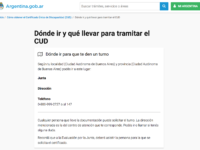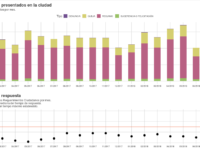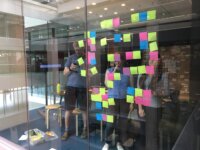The frameworks for creating and managing the rule of government, as reflected in policies, legislation and regulation, are still based on a paper paradigm. In a digital world this creates poor service experiences and often the intent of a policy is not achieved. Instead if we co-design authoritative machine-consumable rules we can provide better services for citizens, better delivery of policy intent, and enable communities, NGOs and private sector to be part of a government service ecosystem.
Innovation Tag: Service Design
HubGov is an interinstitutional program of innovation in Government that has the participation of institution from the three spheres and three powers. Through a learning trail in innovation and intrapreneurship skills, each institution comes up with a complex challenge and at the end of the program presents a solution proposal to this challenge.
Bogota’s Citizen Complaints Dashboard (Tablero Control Ciudadano) is a preventive and social control web tool that displays the requirements that the citizens put before the public offices. The Citizen Complaints Dashboard gives access to public officials and citizens to the analysis and monitoring of complaints, claims and compliments entered into the System.
The Citizen Complaints Dashboard highlights alerting data related to issues regarding time of attention to the requirements as well as…
Minneapolis Public Schools Culinary and Wellness Services rolled out the "Street Eats" food truck in the summer of 2018; designed to increase access to no cost, healthy meals for all youth ages 18 and under. The truck serves at community locations during the summer months where food access is currently limited, such as parks, schools, camps, and libraries.
The Government Digital Service and the Ministry of Housing, Communities and Local Government launched the Local Digital Declaration to support and unite local authorities around a shared understanding of good digital practice.
It is a unique call to action that addresses the legacy IT contracts, isolation of procurement practices and siloed digital projects that have left local government services vulnerable to high delivery costs and low customer satisfaction for the public they serve.
Every week millions of people use the UK government's GOV.UK website to do complex and sometimes life-changing tasks, such as learning to drive, getting a visa, or starting a business.
In the past, finding the guidance, forms and online services you needed could be difficult and time-consuming.
Step-by-step navigation is a new feature on GOV.UK that allows any service to be represented as a series of simple steps.
Case Study
Certificado Único de Discapacidad (CUD) – Redesign of the granting service of the Unique…

Obtaining a Certificado Único de Discapacidad (CUD, a disability certificate) in Argentina was a complex, painful and difficult process. It was a citizen’s right, but did was not a digital service. The process lasted up to 7 months and had 4 steps. There is now one step. A wizard guides citizens in the requirements of the application, an online appointment system schedules the interview and proactively provides notifications in the citizen's digital profile. The redesign of the service put…
The Lab is an all-of-government neutral space enabling agencies to collaboratively innovate to make it easier for people to access government services. It's a design & development lab to experiment, drive and enable the systemic change of government for the benefit of society. We are providing a way to direct public funding to systemic improvements, horizontal efforts around shared goals, capability uplift, high value reusable components and actionable innovation for all participating agencies.
Many years of Australian debate and public division around same sex marriage culminated in a single, nation-wide postal survey. The Australian Bureau of Statistics was given only 99 days to prepare, conduct and release the results of a survey of Australia’s 16 million enrolled voters. An amazing 80% of citizens participated in this voluntary survey, enabled by innovative project management and customer-centric service delivery. The project was delivered for 2/3 of its budget, a $40m saving.
Paseo Bandera is a street in the heart of Santiago that for 5 years was closed for work on the construction of the Santiago new subway line. Because of the closure, it was used for parking and passage of cars all day, being one of the worst streets in terms of quality in the center of the capital. In 2017, it was authorized for 10 months to be pedestrian. With artistic and technological innovation was possible to improve the quality of public space, accessibility, environment and mobility.






